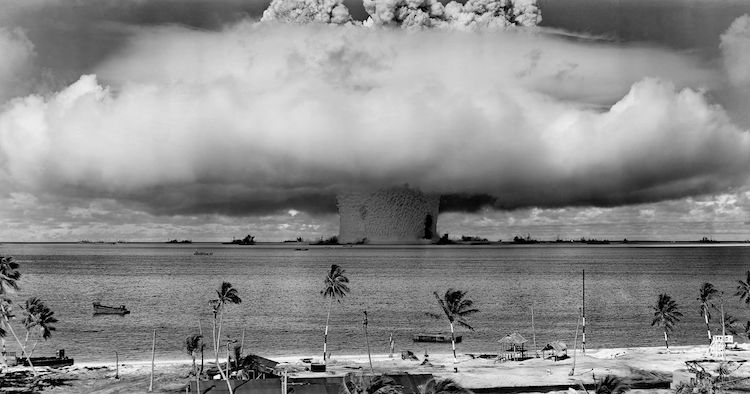By Jamshed Baruah

GENEVA (IDN) – On the eve of a crucial international conference, an eminent Buddhist organization advocating a nuclear-weapon-free world has called for the signing, ratification and early entry into force of the Treaty on the Prohibition of Nuclear Weapons (TPNW) adopted by 122 UN member states as a sign of their resolve to overcome nuclear terror in the interest of protecting human rights and dignity.
Since the adoption of the TPNW in July 2017, non-nuclear-weapon, nuclear-weapon and nuclear-dependent states are meeting for the first time in the Second Session of the Preparatory Committee for the 2020 Review Conference of the Parties to the Treaty on the Non-Proliferation of Nuclear Weapons (NPT) – Second PrepCom of the 2020 NPT Review Conference – from April 23 to May 4 in Geneva.
The Conference represents “an excellent opportunity to consider the deep compatibilities between the goals and commitments of the NPT and the TPNW,” asserts Soka Gakkai International (SGI), which has been championing the abolition of nuclear weapons for over six decades.
The Tokyo-based organization calls for continuing “to heed the voices of civil society, especially those of the world’s hibakusha, so that the NPT process will have a consistently human focus; to declare the shared commitment of the world’s people that the suffering endured by the hibakusha must never be repeated.”
An eminent hibakusha, survivor of atomic bombings, Setsuko Thurlow concisely expressed in her acceptance speech for the 2017 Nobel Peace Prize, the essence of the nuclear issue: Humanity and nuclear weapons cannot coexist.
“This means, in the simplest terms, that we must choose: nuclear weapons or humanity, where humanity points to more than just the continued physical existence of our species, but also to our ability to live in ways that can be identified as humane and toward which all societies have continued to strive,” Thurlow said.
In its message to the Second PrepCom, SGI considers it “crucial that the underlying commonality of purpose as well as the shared commitments and prohibitions between the NPT and the TPNW be recognized and affirmed.”
An important reason is that the TPNW did not arise in isolation from the NPT. The 2010 NPT Review Conference expressed, with the support of all States parties, a renewed awareness of the inhumane nature of nuclear weapons use, and it was this awareness that accelerated momentum for the nuclear prohibition treaty.
Besides, the TPNW gives concrete form to the nuclear disarmament obligations under Article VI of the NPT and promotes their good-faith fulfillment.
SGI argues that even if some States parties to the NPT do not recognize the TPNW as the nuclear disarmament treaty, they have committed under Article VI “to pursue negotiations in good faith on effective measures relating to cessation of the nuclear arms race at an early date and to nuclear disarmament, and on a treaty on general and complete disarmament under strict and effective international control.”
The Buddhist organization asks the Second PrepCom to acknowledge the overlapping prohibitions in the two treaties. “There is no reason to believe such overlapping prohibitions, especially in treaties sharing the same ultimate end of a world free from nuclear weapons, would dilute their normative and practical impact; they can and do stand in a relation of mutual reinforcement,” the statement adds.
In this light, SGI – with 12 million members in 192 countries and regions – calls on governments not yet supporting the TPNW to make public specific prohibitions in the nuclear ban treaty to which they are ready to commit. The prohibition on the transfer of nuclear weapons, for example, or against assisting other states in acquiring nuclear weapons, the lay Buddhist organization states, are among those to which the nuclear-weapon states should be able to commit.
Likewise, SGI says, nuclear-dependent states should consider the prohibition on using or threatening to use nuclear weapons and against assisting, encouraging or inducing such acts in light of their respective security policies.
The statement recalls to the participants in the Geneva Conference that in the wake of the unprecedented destruction of World War II, “freedom from fear” was declared as a crucial, necessary element of our birthright as humans. Since the atomic bombings of Hiroshima and Nagasaki in 1945, nuclear weapons, predicated on fear, have constituted a direct and constant assault on that freedom.
“As people with deep, direct experience of the nuclear weapons regime have noted, we have avoided nuclear disaster more through luck than design, and our luck cannot be expected to hold indefinitely,” notes the SGI statement.
Similarly, the enormous cost of nuclear weapons, with the nuclear-weapon states now allocating trillions of dollars for modernization, continues to undermine another consensus ideal of the post-World War II world: freedom from want.
“As the world rallies toward the achievement of the Sustainable Development Goals, we simply cannot afford the wasteful folly of nuclear weapons, either in their present or their future modernized forms,” stresses SGI.
Perhaps the most pernicious assault nuclear weapons wreak on our humanity lies in the destructive fallacy that we have no choice but to submit to products of our own minds, to the apparent imperatives of our own technological creations, the Buddhist organization notes.
In this sense, it argues, the struggle to eliminate nuclear weapons represents a crucial opportunity for humankind to recover long-threatened qualities of agency, dignity, freedom and solidarity. “These quintessentially human qualities can be effectively deployed in the resolution of the pressing, planet-wide challenges we face.” [IDN-InDepthNews – 20 April 2018]
Photo: Mushroom-shaped cloud and water column from the underwater nuclear explosion of July 25, 1946, which was part of Operation Crossroads. Credit: Wikimedia Commons.
IDN is the flagship agency of the International Press Syndicate
Facebook.com/IDN.GoingDeeper – twitter.com/nukeabolition






